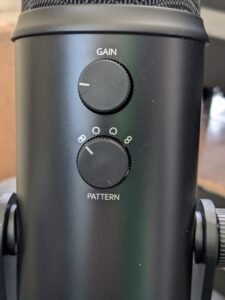The Gain Setting Process
Your real-life clarinet volume covers (at least in theory) an infinite range of values. To express it in digital form we have to map your infinite range into the finite range of a 16-bit (or perhaps 24-bit) number. The ideal situation is for the loudest value you play to map onto the largest possible 16-bit number. If the gain is set too high your loud exceeds the 16-bit digital range and you get clipping (sound distorted). If the gain is too low it works, but you are losing some fidelity.
I thought the Yeti had a clipping warning light. Turns out it doesn’t. This video shows how I used recording software to identify the clipping point, and used that to set my gain.
Verifying the Results
After I went thru this process I checked it out by recording that Kroepsch etude I have been working with. I wasn’t very happy with the result. My recording process was calibrated to my old mic, where I was much more conservative in setting the gain. In fact, there are two different “gains” involved. One on the mic itself and the second one in the recording software. In my old process the mic gain was lower, and I had turned up the input volume in the software to compensate. With the new mic having higher gain, I needed to lower the software amplification. Eventually I turned the mic gain back to 9 o’clock, and took 3db off of the input volume in the recording software. Keep in mind that it all varies with room acoustics and mic placement, among other things. So what works for me may not work for you.


With those changes, here’s how the Kroepsch exercise sounds (NOT from YouTube)
Final Step
I still found the sound to be a bit harsh for my taste (though it doesn’t sound as bad in it’s web form as it did direct from my computer). I decided to see if switching from Stereo to Cardioid pattern made a difference. I liked it better that way. Here’s the video.

Leave a Reply
You must be logged in to post a comment.